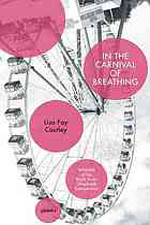Review | In the Carnival of Breathing, by Lisa Fay Coutley
Black Lawrence Press, 2011
 |
With images eddying between the elemental and anti-domestic, Coutley intentionally disrupts the calm lake of lyricism she crosses: her craft capable of quick associative leaps and syntactical nuances, powered by a Plathian candor and set afloat with a “real book” design. “[T]here are plenty of bays / and points, different ways of expressing a shoreline,” she writes in “Much Later, From Space,” and, in instances like these, she allows the current of images to take her, even dipping below the surface of the moment or narrative to see the life beneath—a writing process of associative reckonings:
when a river bend pinches off, leaving
a seed of the former river
behind, we call it a fingernail ripped
too close to the skin, one half of two
lovers spooning, a child’s eye opening
or closing. We can’t decide which.
Though Coutley presents the defining done by the “we” as a literal action, this action resembles the poet in writing: this becomes this becomes this becomes this. Coutley’s verse, unlike the child’s eye, abides always in the process of opening: a word into a phrase, a phrase into a line . . . a single poem into a chapbook.
The inundation of water imagery—bodies of water into bodies of water—complements the writing process Coutley allows to seep into the poems:
I am guilty of baiting mirage and leaving water,
for pretending what’s reflected by wave is
distorted, as if I’ve ever really wanted to look
But Coutley baits the reader: the title and the cover design—an upside-down ferris wheel with mod, hot pink circles—misguide us into expecting mechanisms of amusement or a whimsical rhapsody, but we have neither. Coutley gestures toward amusement in “On Home”:
All winter long my sons have pointed guns
in my face and with their mouths popped
the triggers. The oldest wants to spoon me.
The youngest wants to change his name
to the playground pimp. When we circle up
for dinner, I’m careful not to say chicken breast
or meatball or anything they can follow with
that’s what she said. Consider the going rate
for hormones, then picture an eager group
of eBay bidders.
But even as the hapless ringleader of this barking-seal circus, Coutley dives for colder waters:
I joke, but someone should
tell these boys—in a wake of black mascara,
mothers drive away.
But readers shouldn’t get too caught up in looking for the carnival in these poems. Rather, the act of breathing saturates the collection’s images. In “Respiration,” all of the elements of Coutley’s chapbook come together in a confluence of imagination and narrative resonance:
We say air where once there was water,
but that isn’t right. Pretend you’ve been
asleep at sea with a navy in your chest,
in your Unterseeboot. To wake is to begin
them moving your cargo through hostile
waters, with a promise of never leaving
the vessel, of maintaining radio silence,
and with a perfect naval crew, you neither
fall nor float.
and, with even more gusto:
It’s been too long with
no word from home, waiting for a war
that never comes. It ends then, with a fist
in the face, dogpiled men caught
in a promise to neither leave nor love
one another, a fire lit in an airtight vessel
where no one can open the door.
Coutley and Black Lawrence Press have created a small, smart vessel with In the Carnival of Breathing. With perfect binding, blurbs, and a hip design, Coutley’s chapbook feels like the essence of a full collection, the lyrical core. ![]()
Lisa Fay Coutley is the author of two chapbooks, In the Carnival of Breathing (Black Lawrence Press, 2011), which won the Black River Chapbook Competition, and Back-Talk (Articles Press, 2010), which won the ROOMS Chapbook Contest. She received her MFA from Northern Michigan University, and is a doctoral candidate at the University of Utah, where she is a poetry editor for Quarterly West.